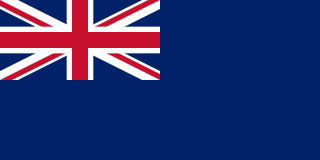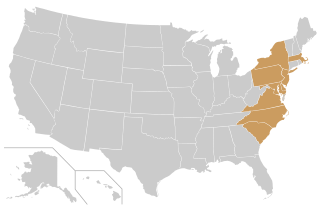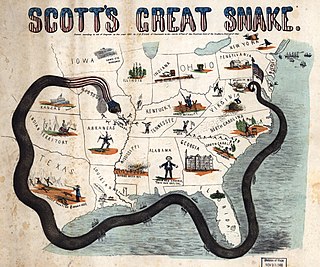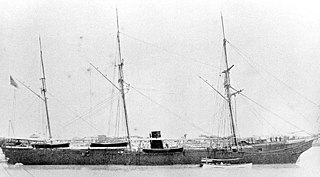
The Falkland Islands are located in the South Atlantic Ocean between 51°S and 53°S on a projection of the Patagonian Shelf, part of the South American continental shelf. In ancient geological time this shelf was part of Gondwana, and around 400 million years ago split from what is now Africa and drifted westwards from it. Today the islands are subjected to the Roaring Forties, winds that shape both their geography and climate.

The Atlantic 10 Conference (A-10) is a collegiate athletic conference whose schools compete in the National Collegiate Athletic Association's (NCAA) Division I. The A-10's member schools are located mostly on the East Coast and Midwest of the United States: Illinois, Massachusetts, Missouri, New York, North Carolina, Ohio, Pennsylvania, Rhode Island, Virginia, and Washington, D.C.

The Blue Ensign is a flag, one of several British ensigns, used by certain organisations or territories associated or formerly associated with the United Kingdom. It is used either plain or defaced with a badge or other emblem.

USS Congress—the fourth United States Navy ship to carry that name—was a sailing frigate, like her predecessor, USS Congress (1799).

On September 3, 1939, the British and French declarations of war on Germany initiated the Battle of the Atlantic. The United States Navy Chief of Naval Operations (CNO) established a combined air and ship patrol of the United States Atlantic coast, including the Caribbean, on 4 September, President Franklin D. Roosevelt declared the United States' neutrality on 5 September, and declared the naval patrol a Neutrality Patrol. Roosevelt's initiation of the Neutrality Patrol, which in fact also escorted British ships, as well as orders to U.S. Navy destroyers first to actively report U-boats, then "shoot on sight", meant American neutrality was honored more in the breach than observance.

The Coastal Athletic Association (CAA), formerly the Colonial Athletic Association, is a collegiate athletic conference affiliated with the NCAA's Division I whose full members are located in East Coast states, from Massachusetts to South Carolina. Most of its members are public universities, and the conference is headquartered in Richmond. The CAA was historically a Southern conference until the addition of four schools in the Northeastern United States after the turn of the 21st century, which added geographic balance to the conference.

In United States colleges and universities, basketball is governed by collegiate athletic bodies including the National Collegiate Athletic Association (NCAA), the National Association of Intercollegiate Athletics (NAIA), the United States Collegiate Athletic Association (USCAA), the National Junior College Athletic Association (NJCAA), and the National Christian College Athletic Association (NCCAA). Each of these various organizations is subdivided into one to three divisions, based on the number and level of scholarships that may be provided to the athletes. Teams with more talent tend to win over teams with less talent.

The first Vandalia was an 18-gun sloop-of-war in the United States Navy during the Second Seminole War and the American Civil War. She was named for the city of Vandalia, Illinois.
The first USS Mohican was a steam sloop-of-war in the United States Navy during the American Civil War. She was named for the Mohican tribe and was the first ship of her class.

The Union blockade in the American Civil War was a naval strategy by the United States to prevent the Confederacy from trading.

Operation Stonewall was an Allied naval and air operation in the Second World War from 26 to 27 December 1943, to intercept blockade-runners sailing to German-occupied France through the Bay of Biscay. Operations Barrier and Freecar, by the Allied navies and the Brazilian Air Force, had taken place in the south- and mid-Atlantic. The ships were tracked by OP-20-G and British code-breakers, which decrypted Japanese machine cyphers and German Enigma machine transmissions to U-boats and blockade-runners.

USS Wachusett – the first U.S. Navy ship to be so named – was a large (1,032-ton), Mohican-class steam sloop-of-war that served the United States Navy during the American Civil War. She was outfitted as a gunboat and used by the Navy as part of the Union blockade of the Confederate States of America.

The Navy Midshipmen are the athletic teams that represent the United States Naval Academy. The academy sponsors 36 varsity sports teams and 12 club sport teams. Both men's and women's teams are called Navy Midshipmen or "Mids". They participate in the NCAA's Division I, as a non-football member of the Patriot League, a football-only member of the American Athletic Conference in the Football Bowl Subdivision (FBS), and a member of the Collegiate Sprint Football League (men), Eastern Association of Rowing Colleges (men), Eastern Association of Women's Rowing Colleges, Eastern Intercollegiate Gymnastics League (men), Mid-Atlantic Squash Conference (men) and Eastern Intercollegiate Wrestling Association. Navy is also one of approximately 300 members of the Eastern College Athletic Conference (ECAC).

The Argentine Sea is a marginal sea of the Atlantic Ocean adjacent to the southern tip of South America. It ranges from the mouth of the estuary of the Río de la Plata in the north to the Isla de los Estados in the south, and from the Argentine coast to the 200 meters isobath. Its width varies between 210 km in front of Mar del Plata and 850 km at the latitude of the Falkland Islands. The coastline extends for 4,725 km. To the east of the Argentine Sea extends much deeper and more extensive Argentine Basin.

College lacrosse is played by student-athletes at colleges and universities in the United States and Canada. In both countries, men's field lacrosse and women's lacrosse are played at both the varsity and club levels. College lacrosse in Canada is sponsored by the Canadian University Field Lacrosse Association (CUFLA) and Maritime University Field Lacrosse League (MUFLL), while in the United States, varsity men's and women's lacrosse is governed by the National Collegiate Athletic Association (NCAA), National Junior College Athletic Association (NJCAA) and National Association of Intercollegiate Athletics (NAIA). There are also university lacrosse programs in the United Kingdom sponsored by British Universities and Colleges Sport (BUCS) and programs in Japan.

The Commander-in-Chief South Atlantic was an operational commander of the Royal Navy from 1939. The South American area was added to his responsibilities in 1960, and the post disestablished in 1967.

The Brazil Squadron, the Brazil Station, or the South Atlantic Squadron was an overseas military station established by the United States in 1826 to protect American commerce in the South Atlantic during a war between Brazil and Argentina. When the Cisplatine War between Argentina and Brazil ended, the station remained and continued to protect American interests during several other conflicts. The squadron was also active in the Blockade of Africa suppressing the Atlantic slave trade. Under French Chadwick, the South Atlantic Squadron was involved in the 1904 Perdicaris Incident in Tangier, Morocco. It ceased to exist when it was absorbed into the North Atlantic Fleet in 1905.
USS Young Rover was a bark with an auxiliary steam engine acquired by the Union Navy during the American Civil War. She was used by the Union Navy as a gunboat in support of the Union Navy blockade of Confederate waterways.

The German commerce raiders of World War I were surface vessels used by the Imperial German Navy for its Handelskrieg, a campaign against Allied seaborne trade. The ships comprised warships, principally cruisers, stationed in the German colonial empire before the war began, express liners commissioned as auxiliary cruisers and later, freighters outfitted as merchant raiders. These vessels had a number of successes and had a significant effect on Allied naval strategy, particularly in the early months of the war.
















